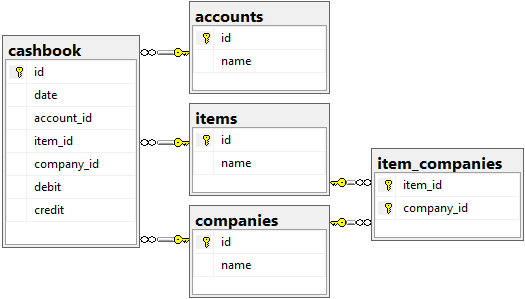Value Lists with ODataDB
ODataDB supports several configurations:
- Validation Lists
- Selection Lists
- Parameter Values
- Value Lists with Fixed Values
- Value Lists Using Tables and Views
- Value Lists Using Stored Procedures
- Value Lists Using SQL
ODataDB automatically creates the necessary OData objects.
The built-in JavaScript client and SaveToDB 8+ support these features out of the box.
Consider a database with the following tables:

The s02.cashbook entity type is declared as follows:
<EntityType Name="cashbook">
<Key>
<PropertyRef Name="id"/>
</Key>
<Property Name="id" Type="Edm.Int32" Nullable="false">
<Annotation Term="Core.Permission" EnumMember="Core.Permission/Read"/>
</Property>
<Property Name="date" Type="Edm.Date" Nullable="false"/>
<Property Name="account_id" Type="Edm.Int32" Nullable="false"/>
<Property Name="item_id" Type="Edm.Int32"/>
<Property Name="company_id" Type="Edm.Int32"/>
<Property Name="debit" Type="Edm.Decimal"/>
<Property Name="credit" Type="Edm.Decimal"/>
<NavigationProperty Name="account" Type="s02.accounts" Partner="cashbooks">
<ReferentialConstraint Property="account_id" ReferencedProperty="id"/>
</NavigationProperty>
<NavigationProperty Name="company" Type="s02.companies" Partner="cashbooks">
<ReferentialConstraint Property="company_id" ReferencedProperty="id"/>
</NavigationProperty>
<NavigationProperty Name="item" Type="s02.items" Partner="cashbooks">
<ReferentialConstraint Property="item_id" ReferencedProperty="id"/>
</NavigationProperty>
</EntityType>
Client applications can use NavigationProperties to create lists.
Assuming the xls.handlers table has the following configuration:
| ID | TABLE_SCHEMA | TABLE_NAME | COLUMN_NAME | EVENT_NAME | HANDLER_SCHEMA | HANDLER_NAME | HANDLER_TYPE | HANDLER_CODE |
|---|---|---|---|---|---|---|---|---|
| s02 | cashbook | account_id | ValidationList | s02 | accounts | TABLE | id, +name | |
| s02 | cashbook | item_id | ValidationList | s02 | items | TABLE | id, +name | |
| s02 | cashbook | company_id | ValidationList | s02 | companies | TABLE | id, +name |
The s02.cashbook entity type will have the following declarations for the account_id, item_id, and company_id columns:
<EntityType Name="cashbook">
...
<Property Name="account_id" Type="Edm.Int32" Nullable="false">
<Annotation Term="ODataDB.ValueList" Path="default.default/accounts_select_id_name_order_by_name1"/>
</Property>
<Property Name="item_id" Type="Edm.Int32">
<Annotation Term="ODataDB.ValueList" Path="default.default/items_select_id_name_order_by_name1"/>
</Property>
<Property Name="company_id" Type="Edm.Int32">
<Annotation Term="ODataDB.ValueList" Path="default.default/companies_select_id_name_order_by_name1"/>
</Property>
...
</EntityType>
The ODataDB.ValueList annotations point to the declared FunctionImports in the default EntityContainer:
<FunctionImport Name="s02_accounts_select_id_name_order_by_name1" Function="s02.accounts_select_id_name_order_by_name1" EntitySet="s02_accounts"/> <FunctionImport Name="s02_items_select_id_name_order_by_name1" Function="s02.items_select_id_name_order_by_name1" EntitySet="s02_items"/> <FunctionImport Name="s02_companies_select_id_name_order_by_name1" Function="s02.companies_select_id_name_order_by_name1" EntitySet="s02_companies"/>
Here are the declared functions in the s02 schema:
<Function Name="accounts_select_id_name_order_by_name1">
<ReturnType Type="Collection(s02.accounts)"/>
</Function>
<Function Name="items_select_id_name_order_by_name1">
<ReturnType Type="Collection(s02.items)"/>
</Function>
<Function Name="companies_select_id_name_order_by_name1">
<ReturnType Type="Collection(s02.companies)"/>
</Function>
Below is a sample configuration for the s02.usp_cashbook procedure, which selects data from the s02.cashbook table and has three parameters: account_id, item_id, and company_id.
| ID | TABLE_SCHEMA | TABLE_NAME | COLUMN_NAME | EVENT_NAME | HANDLER_SCHEMA | HANDLER_NAME | HANDLER_TYPE | HANDLER_CODE |
|---|---|---|---|---|---|---|---|---|
| s02 | usp_cashbook | account_id | ParameterValues | s02 | accounts | TABLE | id, +name | |
| s02 | usp_cashbook | item_id | ParameterValues | s02 | items | TABLE | id, +name | |
| s02 | usp_cashbook | company_id | ParameterValues | s02 | companies | TABLE | id, +name |
Here’s the function declaration:
<EntityType Name="usp_cashbook_result" BaseType="s02.cashbook" OpenType="true"/>
<Function Name="usp_cashbook">
<Parameter Name="account_id" Type="Edm.Int32">
<Annotation Term="ODataDB.ValueList" Path="default.default/accounts_select_id_name_order_by_name"/>
</Parameter>
<Parameter Name="item_id" Type="Edm.Int32">
<Annotation Term="ODataDB.ValueList" Path="default.default/items_select_id_name_order_by_name"/>
</Parameter>
<Parameter Name="company_id" Type="Edm.Int32">
<Annotation Term="ODataDB.ValueList" Path="default.default/companies_select_id_name_order_by_name"/>
</Parameter>
<ReturnType Type="Collection(s02.usp_cashbook_result)"/>
</Function>
This also uses the ODataDB.ValueList annotation to link functions for retrieving parameter values.
You can explore the complete model online:
https://odatadb.savetodb.com/v4/mssql-023/default/en-us/$metadata